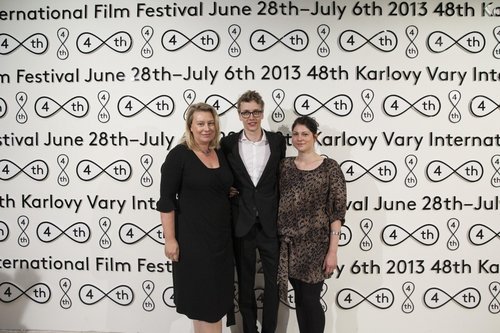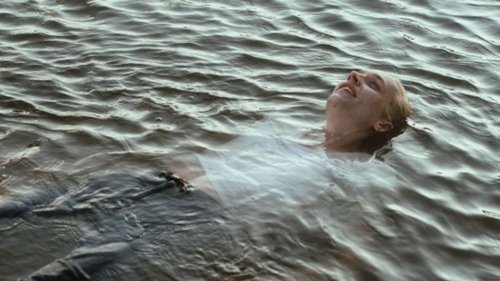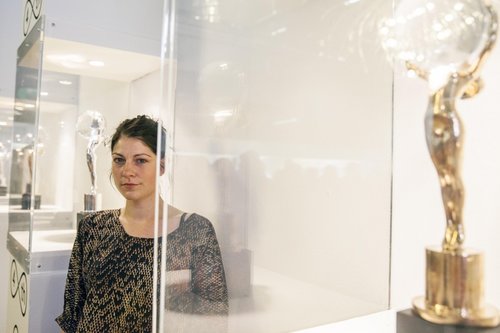Tore Tanzt: Interview with director Katrin Gebbe
17. 7. 2013 # 22.32 # Rozhovory # Bez komentáře
MFF Karlovy Vary 2013
At the end of the movie a „Based on true events“ line is shown. Did you try to create an exact reconstruction of a real event or was the reality just an inspiration for you?
Katrin Gebbe: No, I did not try to create an exact reconstruction of all the characters and situations as they were in reality. I felt there would be so much more to discover and I was not interested in a typical social drama. It made me think that the print saw the family members as ill-natured and the boy as retarded. I wanted to create a story bigger than reality. This movie should challenge its spectator and ask questions concerning good and evil, believe, hope, idalism and love. I wanted to ask spectators the same questions that I care about in my life and which make me fight, questions that make humans human and show what is worth dying for. We tried to put more poetics based on Christ’s suffering symbolic in the movie. We also used a literal source as an inspiration – Dostojevskij’s Idiot. The main hero is also an epileptic, people around him don’t treat him well and use him, drag him to the dark side.
How much was the real incident that inspired your movie promoted in the media in Germany?
Katrin Gebbe: I think the media were not really concerned with this incident, it happend few years ago and I found just a few articles, but it was really powerful to me and I was unable to stop thinking about it. People consume news like this normally, so this case was just one of many for them. In most cases, they consider the criminals simply monsters or bad people and nobody thinks about why those criminal acts happen, how people become murderers. I tried to create a movie that is not easy to watch and just forget about.
When do you want to have a distributional premiere in Germany?
Katrin Gebbe: Official German premiere is planned for the end of September at the Filmfest Hamburg and we are happy that our German distributor is RAPID EYE MOVIES. We had great response from press, the movie was considered a highlight, a different movie in the world of regular German movies based on big stories, mainly for its different attitude and intransigence. It is possible to have many views on our movie and most of the critics appreciated that.
Do you think it will be more difficult to screen this movie in countries that are more orthodox than Germany?
Katrin Gebbe: I don’t think so, because we did many test projections. We invited believers and church affiliates. Their response was very good, they liked the movie and they took it as an image of Christ’s suffering. Faith is about that, going for your goal resiliently, isn’t it? We don’t judge anyone by making this movie, we just offer different perspectives, we did not aim to make anyone furious.

Had you come to contact with the movement Jesus Freaks before making this movie?
Katrin Gebbe: I came to contact with this movement around 15 years ago on a concert. I thought they were lunatics, because I am not a believer. But after my research I think their approach to modern service is intersting. Jesus Freaks are a healthy alternative showing that believing in god can be cool and beautiful and can attract especially young outsiders, who can find there their place, friends and even family. There is a lot to discover while the catholic church had a lot of bad headlines recently, I didn’t like to combine those vibes with Tore’s background.
How did you work with actors, did you use some specific method?
Katrin Gebbe: For me it is important to create a strong base that is build upon discussions with actors about the topic of the movie and the relationships between the characters. I asked the acters some questions, about their needs and backstories. For example Julius was preparing on his own at first, thought about the character of Tore. I offered him a lot of film materials on DVD that could have been inspirational for him. It was important to me to build the character of the young man gradually, a young man that is not common, that thinks differently, moves differently and behaves strangely. We discussed a lot where the limits of violence would be set, what the camera should show and what not. Later we did a series of rehearsals together with the other actors.
Can we discuss the name of the movie Tore Dances? We see the connection to epilepsy, is there some other meaning too?
Katrin Gebbe: The name hides many meanings, we deliberately chose a name with three T’s, because they associate crosses in our visual language. The idea of dancing is expressed and used in the movie few times, there is even one scene, in which the characters just start dancing. We see dancing as a way how to free ourselves of decisions of others. A man is free only when he dances, as Nietzsche put it. The poetic title of the movie is also connected to epilepsy, a “dance on ground”, that was historically associated with both positive and negative connotations, and we want to show the polarity of good and evil that can be seen in our movie.
Was it difficult to finance the movie, even though it is a low budget project?
Katrin Gebbe: Yes, it was difficult, but finally we found the best partners. In the beginning we luckily got some money for the creation of the script by the filmfund Hamburg Schleswig-Holstein, that made our situation quite easier and I could have completely focus on the writing. The support gave us confidence. We tried to get some money from television, but the movie is heavy and full of violence, so it was really hard to convince someone. Also because we did not want to make big changes in the script, we wanted to stay creatively free. The ZDF – Das kleine Fernsehspiel was the perfect match, because they wanted to make the same movie. We only raised half the money a first feature normally gets but we enjoyed support and freedom. In the end, we got some more funding by filmfund Hamburg Schleswig-Holstein and Nordmedia and were able to get the technical equipment for a very low price.

Do you consider the screening in Cannes a big success? We heard from Karel Och that the reaction there was not so warm…
Katrin Gebbe: Cannes was a great opportunity for all of us. We were very lucky, because we were the only one German feature movie in the official programme and that was the biggest ad for us. When you are in Cannes everybody is interested in your movie. Concerning the first screening, in my opinion it went really well. Some spectators reacted very intensely just after the last shot of the movie. The atmosphere was very hectic. A few of the leaving spectators even booed, some stayed in their seats and let the story resonate. The rest was very excited and we got minutes of standing ovations.
Julius Feldmeier: I think it’s a pitty that the endtitles were cut off. The audience should listen to the music, that I think is really worth listening to in this case and is highly emotional. It would be great to have at least ten seconds to think about what you have watched, but there is no time for that in Cannes.
Katrin Gebbe: Cannes festival is very business oriented, the deals are made there, people buy and sell movies. In Karlovy Vary we were able to meet ordinary audience, consisting mostly of young people who were able to give the movie their attention and got into it. I have a really good feeling from the screening here.
Do you want to stir controversial reactions?
Katrin Gebbe: In Cannes, people talked about the movie a lot, so there was some controversy. For me, the biggest power lies in the movies that are not completely closed, self-contained. Here in Karlovy Vary, at the end of the projections, a small anecdote happened to me. One young boy ran to me and shouted loudly “Stop! Stop! I have a question! What did you want to communicate through this movie?!” But this question is for you to answer, the spectators. I am personally interested in how to not tell a story simply. I want to plant seeds of doubt and put in the movie something that may even make you furious.
Do you have some other topics or themes that you would like to shoot about in the future?
Katrin Gebbe: I have quite a few ideas in my head, but I don’t know which one I will choose as my second feature movie. What I am interested in most and what I touched in my debut are people, that long for something very much and than something happens, something that changes their surroundings and their attitude towards life. People always search for some simple way how to believe in someone or judge, but that is impossible and there lies the tragedy of all humankind.
We hope you will visit Karlovy Vary with your next movie, maybe even the Official Selection – Competition. We heard that Tore was supposed to be one of the competing movies, but because of the screening in Cannes it was shown in the Another View section.
Katrin Gebbe: For me it was great experience to show my movie to this audience, we got the possibilty to screen in this great theater, eventhough it wasn’t in the competition. That’s a big compliment. I am always happy when I meet someone that is on the same wave considering the perception of TORE TANZT. Karel Och, who chose the movie for the programme, is that kind of man. On other festivals, the choice of the movies is a lot about the business, people care about the awards and where the movie was screened. That is why I value the fact that Karel was interested in the movie even before the invitation the Cannes, without any references from other festival, awards or such.
Czech version here
Autors of interview: Adel Mrázová, Jakub Jiřiště
English translation: Matouš Svěrák
Photo: Getty Images Entertainment, MFF Karlovy Vary 2013


 Odebírat RSS
Odebírat RSS RSS komentářů
RSS komentářů
















